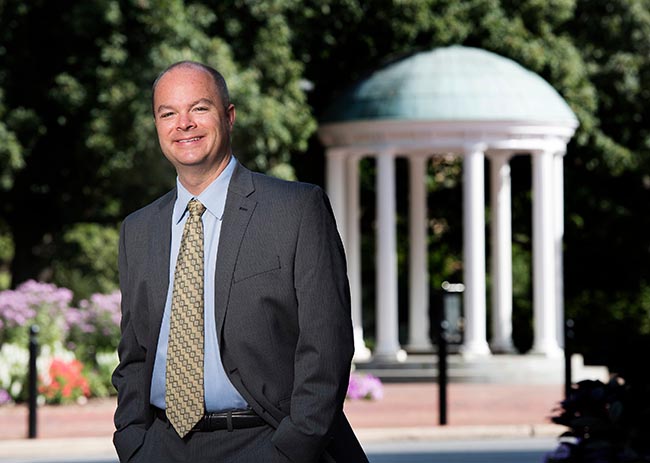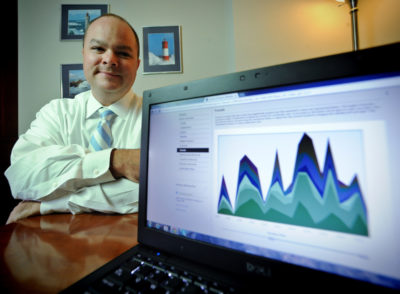
Over 16 years, Andy Johns has built a reputation as the indispensable fixer of thorny issues
Johns has held many important titles at Carolina since he graduated in 1998 and went to work as a computer consultant for Administrative Information Services (AIS) in the red brick building at 440 West Franklin St.
But wherever he has gone, one unofficial label has always stuck: Problem solver.
And a problem solver in the Office of Sponsored Research (OSR) was exactly what Executive Vice Chancellor and Provost James W. Dean Jr. and then-Vice Chancellor for Research Barbara Entwisle were looking for last fall when they asked Johns to serve as its interim director.
When Johns arrived at the new post on Sept. 28, the office was in trouble. Within a span of the previous six months, most of the senior leadership had departed. And many positions in the office were vacant, Johns said.
The lack of manpower put yet more pressure on the beleaguered remaining employees, who were under siege from all sides about the work the OSR was either not getting done – or not getting done correctly.
OSR assists faculty and staff in all aspects of research administration – from monitoring institutional compliance with terms of grants or contracts to handling billing and financial reporting.
As senior associate vice chancellor of research, Johns understood better than anyone how vital the OSR is to sustain and support the University’s burgeoning research enterprise, which by fall of 2015 had climbed to eighth nationally among public and private universities in overall research and development (R&D) and sixth nationally in federal R&D spending.
The office had concerns, including delays with reports, the process for setting up new grant awards and budget tracking.
Johns understood part of his assignment was figuring out how and why all this was happening – and fixing it. But he also knew his first task was to instill confidence in the remaining employees that there was a path forward for them to be part of the solution.
That meant being present, which is why, for the past 11 months, he has spent most of his time troubleshooting problems and restoring morale in the OSR office instead of his office in South Building.
Another important step he took was to hire temporary outside resources to fill the breach, which required intensive training. Gradually, the situation began to stabilize as employees began to see progress and a plan for the future.
“It is easy when you are dealing with an overwhelming situation to get overwhelmed,” Johns said. “At the time, it was easy for people to say, ‘This is an impossible situation.’ No one person could come in and snap their fingers and make a problem go away. It had to be a team effort and it was. One day at a time, one step at a time, one transaction at a time, we started to climb out of the issues we faced.”
By spring, Johns shifted his focus from negotiating the challenges to rebuilding the OSR office to “make it strong and sustainable long-term to serve the needs of our campus and our sponsors.”
It was about that time that he found out he had won a 2016 C. Knox Massey Distinguished Service Award.
‘Failure wasn’t an option’
Chris Kielt, vice chancellor for information technology, described Johns as an “essential leader of an immensely complex research enterprise” in his nominating letter. “Andy is someone who wakes up each morning to ‘do the right thing,’ tirelessly taking on thorny issues from a principled perspective balanced with a pragmatic understanding of the possible.”
Dwayne Pinkney, vice provost for finance and academic planning and University secretary, wrote in his nominating letter of how “he has always been willing to roll up his sleeves and work on through complex administrative and procedural issues impacting the broader university community.”
Johns said he appreciates the award, if not the renown that comes with it.
“I hate the attention,” Johns said. “What makes me tick is solving problems.”
A case in point has been his work over the past year at OSR.

“Even though it wasn’t all fun dealing with the long hours and the stress and frustration, it was a time to lend a hand and see if we could fix this thing. Failure wasn’t an option.”
The temporary job that was supposed to last a few months has continued. Eleven months in, Johns still spends four days a week in the OSR office in the Administrative Office Building off Martin Luther King Jr. Boulevard and only one in his regular office in South Building.
Many people attributed the root cause of the crisis in OSR to ConnectCarolina – the new business-management software known as Enterprise Resource Planning (ERP) – that went fully live for all business-related functions at Carolina in October 2014.
Johns knows that isn’t the case.
“When asked what went wrong, the knee-jerk response from many people across campus was to blame the new system,” Johns said. “The system was a factor, but the challenges we faced were multi-faceted. But the transition to ConnectCarolina was not so much the cause of the problems as it was the catalyst that revealed inherent weaknesses in our administrative operations.”
A hidden culprit Johns found was the reliance upon old ways of doing things that needed updating.
“As a result, when we went live with ConnectCarolina, we found ourselves in a situation where we didn’t have the tools needed to do the job because we hadn’t planned appropriately.”
When Johns explained the situation to Dean, the provost said, “Implementations like this make strong organizations stronger and absolutely destroy weaker ones.”
He got it exactly right, Johns said.
“We can play Monday morning quarterback all we want about why that was, but that was the situation we found ourselves in,” Johns said. “We were not prepared.”
Back to the future
Since spring, Johns and the OSR team have developed a new organizational chart for OSR with positions split across four different functions: research administration; sponsored projects accounting; cost analysis and compliance; and operations.
The last order of business will be hiring the permanent executive director of OSR. Johns will supervise that hire from back at his old office back in South Building, working with his new boss, Terry Magnuson, who was named the new vice chancellor for research in February.
While responsible for strategic planning, research policy, infrastructure and regulatory compliance, Johns has developed systems over the past decade that fundamentally changed the way Carolina functions as a research-intensive university.
Perhaps his crowning achievement was RAMSeS, an acronym for Research Administrative Management System and eSubmission.
Developed a decade ago, the system has become the electronic linchpin efficiently connecting all aspects of Carolina’s research enterprise. Eventually, UNC General Administration established a master agreement to allow pieces of RAMSeS to be available to every campus in the UNC system.
Johns built on RAMSeS’ success by developing REACH NC (Research, Engagement and Capabilities Hub of North Carolina), which became a statewide comprehensive web portal for information on the research enterprise and capabilities at North Carolina’s universities and research institutions.
Johns is eager for the next challenge that awaits.
“Terry and I have already been talking about what we want to approach next, and a lot of it falls in the general spirit of if we stand still, others will pass us by,” Johns said.
“We need to really think about doing things differently. It’s not change for the sake of change, but being smart about where we change, recognizing that there are opportunities to do things better than we do today.”
Andy Johns
Home: Chatham County
Job: Senior associate vice chancellor of research and interim executive director of the Office of Sponsored Research
UNC employee since: 1998
Interesting fact: He is an avid gardener. “It is therapeutic for me because I can go out in the garden and do what could be considered mindless work. But while I am working, the wheels are turning about problem solving for what I am dealing with here. That allows me to look at things differently, which is what is actually needed to solve problems.”
Family: Wife, Cate, and two children, Maggie and Miles
By Gary Moss, University Gazette
Originally published by University Gazette: August 23, 2016